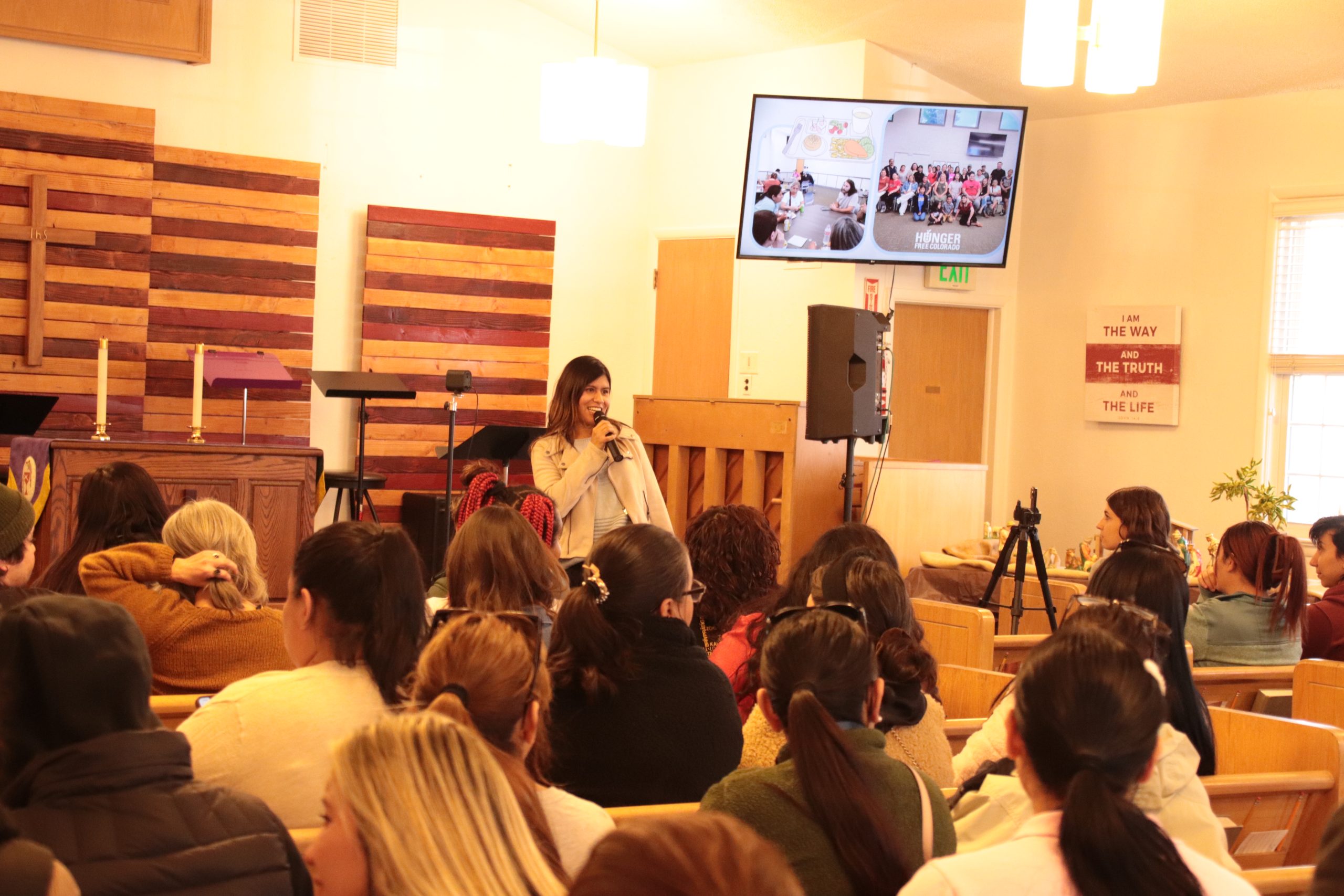Parents, students, school nutrition professionals, farmers and community advocates recently gathered in Lakewood to push for the continued funding and full implementation of Colorado’s Healthy School Meals for All program.
“We decided to have our event here (in Lakewood) because it’s the heart of the Jeffco school district, and it’s where the Jefferson Healthy Food Pilot program began,” said Erica Cervantes, Director of Organizing and Community Partnerships for Hunger Free Colorado.
Launched after the passage of Proposition FF in 2022, Cervantes said the program has already made a significant impact by providing over 600,000 free meals to students, reducing the stigma around free lunches and supporting local economies.
But amid rising food costs and growing participation, advocates say more funding is urgently needed to sustain the program. According to Chalkbeat, while Proposition FF raised more than $100 million to provide free meals for students, there was a $56 million shortfall last year.
These advocates are calling on state lawmakers to step in during the 2025 General Assembly to ensure the program can continue to feed students, support school cafeteria staff and provide schools with fresh, locally sourced ingredients.
A call for community-driven solutions
“This assembly is important because we are the voice of our children and we are part of the community,” said Paola Carreño, a mother and part of the Jefferson Food Pilot Council.
“It’s not just to leave our children without free, fresh, healthy and culturally relevant food since my son is part of tomorrow’s future. My participation in this event and effort is a call to action to unite as a community because in unity there is strength,” she continued.
Several speakers echoed Carreño’s words at the event, and the message was clear: healthy free meals for all must continue.
Advocates highlighted the program’s benefits, which include helping families save around $1,300 per child annually, reducing food insecurity and creating opportunities for students to access healthy, fresh meals at school, which may be the only meals they get during the week.
Beyond free meals
“We know the massive impact Healthy School Meals for All can have on the health of our local food system and everyone who touches it,” said Jen O’Neal from Common Harvest Colorado. “There is so much potential to continue to shape the future of our food system — for our kids, our planet and our local economies.”
O’Neal emphasized that supporting local farms and producers strengthens local economies and provides healthier meals for students.
Despite its success, parts of the program remain on hold due to a lack of funding. Essential components like wage increases for cafeteria workers, equipment for cooking fresh ingredients and infrastructure improvements in school kitchens are currently paused.
“The food is free, but the rest of the pieces of the program are currently on pause because there’s not enough funding,” Cervantes said.
Without the necessary support, advocates fear the program will fall short of the vision Colorado voters had when they overwhelmingly backed Proposition FF.
Voices from the frontlines
“I like to say that I’m an educator who serves lunch because I try to educate my students on the importance of eating healthy and staying away from junk food,” said Andrea Cisneros, a kitchen manager for Jeffco Public Schools.
Reflecting on her childhood experiences with food insecurity, she said, “When I was a kid, growing up, we would go behind our local grocery store and jump in the dumpsters and get our dinner… My lunch ladies, my lunch men, my staff that fed me were very important to me growing up. They must have known I was poor. They’d always give me extra servings of food.”
Today, Cisneros finds herself on the other side, advocating for students to have access to fresh, healthy meals and for cafeteria workers like herself to be supported with livable wages. She pointed out that, due to budget constraints, many cafeteria workers are forced to sell junk food to students to generate extra revenue for school districts.
“I think our government, our local legislators, need to be held accountable to make sure that our schools receive enough money to keep this program going,” Cisneros said.
Her goal is to see schools fully funded so that processed snacks and a la carte sales are no longer used to fill budget gaps.
Advocates urge lawmakers to act
At the heart of the gathering was a call for lawmakers to recognize the Healthy School Meals for All program’s transformative potential and fully fund it. Advocates believe funding the program isn’t just about free meals. They say it’s about supporting students’ physical and cognitive development, strengthening local food systems and ensuring equitable access to healthy food.
“This program has saved families money at a time of great hardship for many people in our community, and support has only grown as people have seen firsthand the positive impacts,” Cervantes said.
Cervantes explained that the goal is to sustain the program and fully implement its original promise to ensure local sourcing, pay school nutrition workers fair wages and create from-scratch meals in school kitchens.
“No kid should go hungry because their family is struggling to make ends meet,” Cervantes said. “We are working to make sure that we can sustain and build this program. The Healthy School Meals for All program is an investment in public education and in our children who need healthy food to learn.”


